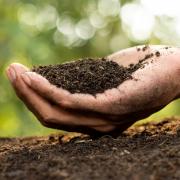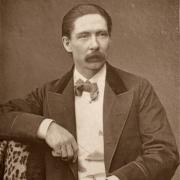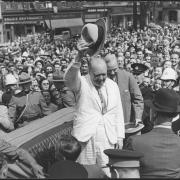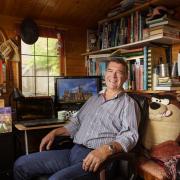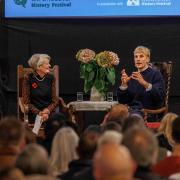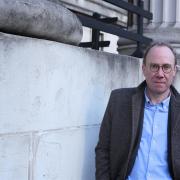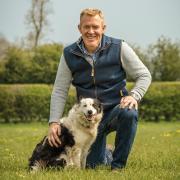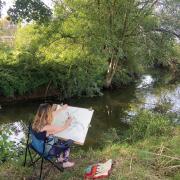The Cotswold farmer and Countryfile broadcaster is behind Keeping on Track, a new podcast for farmers struggling with mental-health difficulties.
To begin, a few stories (though ‘story’ seems a word imbued with a light-heartedness that has no place in the next few paragraphs). Still, stories are what we, as human beings, identify with. And, if this article has any purpose, it’s to get people to identify with what follows. Philip Watson is now senior lecturer in agricultural studies at Hartpury University. Before his academic career, he worked on dairy farms, managing them for others: a job he felt passionate about. Even though that often meant getting up at 4am and working through until six or seven o’clock at night; mostly alone.
‘Then going home at night and being tired and trying to be socially interactive with my wife and the children.’ When, really, all he wanted to do was sit in a chair and sleep.
‘I was loving the work that I was doing,’ he reflects, looking back; ‘but it was having a physical and mental impact on me that I probably didn’t realise.’
Others did. Including his wife, who tried hard to support him: ‘Now, sadly, my ex-wife.’
Unsurprising, perhaps. For her husband had gone from being cheerful and chatty to withdrawn; often tearful. ‘Always looking back on the things that don’t quite go as you expect them, rather than the positive.’
But if Philip was good at farming – which he most certainly was – there’s another skill he was learning, too: ‘I think I did quite a good job of hiding that [depressive] side of things.’
Then there’s Michael Keel: life and soul of a party. Farmer-turned-firefighter, his specialist knowledge was invaluable within the service.
‘The reason I got to know him is that he got down to the final of the selection of the Countryfile [BBC TV presenting] job that I got,’ Adam Henson says. ‘And he became a friend.
‘We ended up filming with him for Countryfile about his work training firefighters on how to deal with an incident where animals were involved.’
Philip Watson (who thought he should ‘man up’; ‘put on a brave face’) was finally persuaded to seek help. Thanks to therapy, and to medication ‘which I’ve been on and off for the past 24 years’, he’s managed to re-find an equilibrium. Now he helps provide support for farmers – including students - experiencing mental health difficulties, encouraging them to find the courage to be open and honest about their struggles.
Michael Keel died by suicide in June 2019, aged 43.
Adam Henson doesn’t ask people how they are anymore. Or, rather, he doesn’t just ask them how they are.
‘There’s a guy called Olly Harrison who does Olly Blogs [Olly Blogs Agricontract],’ Adam tells me. ‘He’s got a really good YouTube channel. He’s a farmer up in Liverpool who I’ve got to know, who has a good way of drawing the conversation out of people. Which is what you’ve got to do.’

Olly says, ‘How are you today?’
If you say, ‘I’m fine’, he asks: ‘As a percentage?’
‘So, I’ve started using that,’ Adam says; ‘but I say, ‘Out of 10?’’
We’re sitting in an office at Cotswold Farm Park near Guiting Power: the hugely successful rare-breeds centre (Gloucestershire Old Spot pigs; Exmoor ponies; White Park Cattle and Golden Guernsey goats amongst them) offering families a day out on the farm.
Fun; educational; important in terms of saving some of Britain’s most loved farmyard animal breeds – but also (let’s not forget) part of a vital income-stream for this mixed, tenanted, 1600-acre farm.
Who knows what Michael Keel might have replied had he been asked how he was out of 10.
All Adam knows is that he never suspected there was a problem. ‘Michael was the sort of person who would help other people.’
A tragedy is a tragedy, even if good comes out of it.
But good has come out of Michael’s life. His fiancée, Sam, co-founded the Even Keel Foundation in his memory, ‘unmasking’ mental health issues in men.
And then, four years later, a new podcast: Keeping on track: A farmer’s wellbeing podcast, launched by Adam Henson. The podcast journey – and it’s never a quick process – can trace its path back to the aftermath of Michael’s suicide.
‘We did some pieces on Countryfile about it,’ Adam says, ‘and I was shocked by the statistics in my script.’ In other words, a personal loss suddenly revealed itself as a nationwide problem of unbelievable prevalence.
The most recent statistics, from a 15,000-response survey by the charity RABI (Royal Agricultural Benevolent Institution), carried out across England and Wales, revealed:
• 1 in 3 farming people are possibly or probably depressed
• Over half of the women in farming (58 percent) experience mild, moderate or severe anxiety
• A strong link between the financial health of a farm business and the mental and physical health of the people operating it.
Perhaps that last point is a ‘well, der’ moment. And, yes… But think about it for a moment.
Because I’ve listened to these podcasts – aimed at farmers, of course – and they’ve somewhat blown my mind.
Those cheery farmers selling you beef, chicken, leeks, potatoes; making you ready meals so you can relax after work with a glass of wine; sausage rolls for an easy lunchbox. Ever given them much of a thought beyond which type of cheese you might buy?
Can’t really say I have.
Yet Adam’s podcast talks of uncertainty; things beyond their control that can wipe out a £150,000 field of potatoes almost overnight.
Floods;
Droughts;
Disease – and no compensation.
‘I spoke to some people this year who planted beans, which failed because of the weather. They didn’t even get the seed-rate back.’
In essence, they didn’t even recoup the weight of what they’d planted.
‘The losses can be horrendous.’
There’s paperwork that – often – farmers leave to the evening. (After all, cows won’t wait; crops won’t wait to be gathered before the rain hits.) And then, as a farmer sits down at the computer at night, come mistakes made through sheer exhaustion.
And – quite rightly – complaints from partners: ‘All our other friends are meeting for dinner! How come we’re still at home!’
Ah, yes. The loneliness, too.
A hundred years ago, crowds from the community would work on a harvest; schools would plan their holidays around it. Now, more than likely, it’s one person on a tractor, sitting in a cab (air-conditioned; sound-system plumbed in; isolation in luxury), not seeing anyone from one hour through the next 20.
‘If I see someone with a limp,’ one of the many amazing contributors to the podcast says, ‘I think: That’s a farmer.’
Adam nods with trademark – though rueful – grin.
‘I’ve just had a hip resurfacing operation. I was five years limping. The average age of farmers is quite old, and they just don’t have the time.’
Yet do we thank them for this dedication to producing quality food for our dinners?
Almost certainly not. As UK farmers slog away, employing some of the best welfare standards in the world, we get government ministers telling us that hormone-injected Australian beef is ‘absolutely delicious’.
We get social media posts, blaming them for climate disasters.
OK – so I’m not going to continue listing the problems farmers face; the problems all of us face, but often for them with depressing added value.
One of the 15 podcasts made so far focuses on Adam’s story. If you’d like to know more, why not start with this, in which he talks in more depth about issues the agricultural community must deal with.
‘We recorded [that episode] and they sent it to me. I listened to it, and I cried.’
These podcasts are meant for the farming community. To persuade farmers – via brilliant personal-experience interviews and expert input – to look after their mental health; to value their own wellbeing. To point them in the direction of the many charities and organisations that are there to provide real backing when times are tough. To provide hope and uplifting stories.

But I say to Adam, these podcasts aren’t just for farmers; they’re for everyone.
Are you the partner of a farmer?
Then they’re for you.
Are you a member of the public?
Then they’re for you.
‘Do you eat food?’ Adam chips in.
I mean, quite. They’re for you.
Adam Henson has always wanted to be a farmer. Even when, as a teenager, he’d bring a friend home from school, then have to disappear at 9pm to do the nightshift on the same tenanted farm where he now lives. His dad, Joe Henson, is a hero for the extraordinary work he did saving rare breeds – to Adam and to others. And, like many dads in those days, he ran a tight ship. Adam and his sisters were expected to help.
At 17, falling asleep in the classroom was an occupational hazard for Adam. He doesn’t in the slightest blame his parents for the fact that he failed all his A levels. But the reality is, he then had to retake them through night-school, while trying to earn money working ridiculous hours (he needed the cash) on the Chatsworth Estate. That dedication got him into agricultural college.
He’s lucky. He knows that. Today, his close friend and business partner, Duncan Andrews, is the yang to his yin in so many ways; (particularly in terms of the finances; the spreadsheets and paperwork that Adam hates with a passion).
And then there’s the family: Adam’s supportive wife, Charlie; their children Ella and Alfie. Always there for each other.
Alongside these new podcasts, there’s the continuing work of the Cotswold Farm Park. Because linking the public with the food they eat can only be a positive in this relationship between Britain and its struggling farmers.
‘We do pick-your-own potatoes here,’ Adam says. ‘A few years ago, there was a group of young women who came, so I gave them a bag and a wheelbarrow and fork.
‘They walked out onto the muddy potato patch and said, ‘We can’t find any!’
‘I said, ‘That’s what the fork’s for! You’ve got to dig for them!’’
When they started digging and found one, the excitement was off the scale: ‘It was like they’d found the Holy Grail.’
We both laugh. And then we stop.
‘Yeah,’ Adam says, ‘I laughed at the time; but then, afterwards, I thought: That’s quite sad. Quite serious. Because I’m sure they eat crisps and chips and mashed potatoes.’
Same thing when he took some sheep to a school north of Birmingham. A pretty deprived area, where a lot of the children had never seen one in real life before.
‘So, there is a huge disconnect between food and farming and land-use and conservation.
But the great thing is, there are all sorts of television programmes and countryside coffee-table magazines and radio stations that are now embracing and talking about food and farming. The viewing figures of a lot of these countryside programmes are very strong.’
The people in the podcast who talk about the problems they’ve experienced – Terry Pickthall of Harper Adams; Philip Watson, of course; and others, too – say they’ve never looked back after seeking help, even though their initial reluctance made it hard to begin.
‘Nobody is immune,’ says David Exwood, vice president of the NFU. ‘Looking after myself has made me a better farmer and man.’
We chat, Adam and I, about his and Charlie’s recent holiday – flew to Pisa; then on to Florence.
Yes, he probably spent most of the first couple of days sleeping. Yes, he keeps half an eye on emails.
But they had a fabulous time.
‘The cathedral in Siena is mind-blowing: the Duomo. Charlie and I were debating, ‘Shall we go in?’
‘And I said, ‘Come on! We’re probably never going to come again.’ And it was overwhelming: the multi-coloured marble; the painted ceiling; the windows; the beauty of the art.’
He talks about it in the same way he talks about his love of the Cotswolds; of being a farmer, outside in the fierce beauty of nature.
‘The sunsets, the sunrises; the hare running across the field; the beautiful flowers in the margins; the sun on your face; the leaves under your feet.
‘It all sounds a bit corny perhaps. But that’s real.
‘If I go out in a blowing gale and the rain is hitting me hard in the face and I’m with the dogs, that’s powerful and emotional and lovely.’
A short time after we meet, I read in the news, ‘BBC Countryside star in urgent wedding after cancer diagnosis’.
It stops me in my tracks.
Charlie was diagnosed with pancreatic cancer at the end of 2020.
Marriage had never been important to them – having children together was their commitment – but the week before her operation, they booked the first available appointment in Stroud Register Office.
Charlie’s recovery is on-going.
I didn’t know; I didn’t know, when I spoke to him amidst the idyllic surroundings of the farm park.
‘You really weren’t to know,’ he replies to my email, with typical Adam kindness, ‘and it’s not a topic you need to consider in your article unless you felt you wanted to.’
We send such love to them all.
Keeping on track: A farmer’s wellbeing podcast, created in partnership with Team Doctor, is available for free on major streaming platforms.




